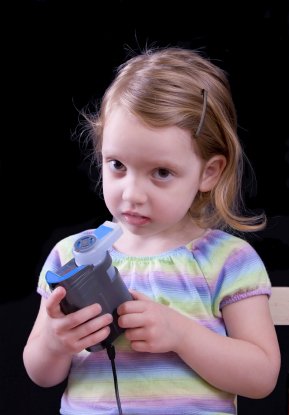Dr. Caron wrote this wonderful article on childhood asthma. As a child growing up with asthma I could relate to everythign she said. I had some pretty bad episodes, some that landed me in the hospital emergency ward and a couple where I was admitted. An attack can be a very stressful and scary time for your child, it is very important that the adult remains calm so as not to make the situation even worse. ~ Kevin ~
Stressing Out Over Asthma by Dr. Caron B. Goode
 Asthma attacks are stressful. They start innocently enough with a slight wheeze or a little cough. Then it is all downhill from there. First, the asthmatic feels his chest tighten and is unable to breathe. This justifiably produces feelings of panic, anxiety, and helplessness. These emotions escalate with the episode, which in turn perpetuates and lengthens the attack cycle.
Asthma attacks are stressful. They start innocently enough with a slight wheeze or a little cough. Then it is all downhill from there. First, the asthmatic feels his chest tighten and is unable to breathe. This justifiably produces feelings of panic, anxiety, and helplessness. These emotions escalate with the episode, which in turn perpetuates and lengthens the attack cycle.
As if an attack is not bad enough, this scenario can be easily repeated at the drop of a hat. The cells in our bodies have many functions, one of which is to store memory. During asthmatic episodes, they record the emotional trauma and intensity of the attack. This is so the body can be prepared should it face the situation again. Even though this sounds like a solid plan, it actually ensures that just thinking about an episode can trigger one.
Yes, asthma attacks are stressful. They are also frightening, especially for children. As parent or caregiver to an asthmatic, all you want is to make everything better. But how? There is no cure for asthma. There is, however, a way to help your child prepare for the inevitable episodes. There is a way to lessen his panic and soothe his anxiety—and it is right in front or should I say inside of his nose. It is his breath.
While, it may seem somewhat ridiculous to suggest that an asthmatic use breathing to regulate his asthma, that is precisely what I am doing.
One thing all [tag-ice]asthmatics[/tag-ice] have in common is feeling they have no control. The one bodily function all of us have some control over is our breathing. Therefore, learning to breathe in a manner that compliments his episodic patterns will enable him to relax and regain a sense of control.
In addition to being healthy and empowering, breathing exercises can be fun! Give your exercises and your practice time silly names. Make breathing exercises a family affair, perhaps as an after dinner ritual or a playful way to start the weekend. By including some type of breathing exercises in your child’s [tag-cat]asthma[/tag-cat] care plan you are sending him a powerful message. You are telling him that you have confidence in him and believe in his ability to handle his health.
Breathing Exercises for Children
- Balloon Belly—Lie on your back and close your eyes. Imagine your belly contains a big, beautiful red balloon. The problem is you need to fill it with air. Place both hands on your stomach and inhale. You will notice your breath stopping at the top of your lungs. This is a normal shallow [tag-tec]breathing[/tag-tec] pattern. But to fill the balloon, you must breathe deep into your diaphragm. Therefore, it is necessary you continue inhaling. Feel your breath travel past your lungs into your upper stomach and finally reaching its destination—the belly balloon. Imagine as you inhale, the balloon is filling. When it reaches capacity, hold your breath for a second or two. Then slowly release it.
- Main Squeeze—This is a great relaxation exercise. It teaches children to be aware of their bodies, muscles, and tension. This exercise can be practiced either sitting or laying. Take a deep breath. As the oxygen travels through your body, tense your muscles. All of them and tense them tight! When you exhale, start at the top of your head and relax your muscles one by one. Imagine them as tight coils that unfurl bit by bit as you exhale. Once all your muscles are relaxed, remain in that position. Take several full, deep breaths and enjoy the sense of feeling like one big wet noodle!
- Tiny Bubbles—Blowing bubbles is a fantastically fun breathing exercise. You can pick up a bottle of bubble and a wand for next to nothing or even make your own. Slowly breathe deep into your diaphragm and as you breathe out imagine the bubbles you are sending out into the world are filled with happiness and love. Blowing bubbles helps you expand your breath and your breathing. Filling them with happiness and love helps you expand your goodwill for your family, neighbors, and the world.
Biography:
Dr. Caron Goode is the founder of the Academy for Coaching Parents International which provides training and certification for students to operate their own Parent Coaching business.(www.AcademyforCoachingParents.com) Caron and her husband, Tom Goode, ND, live in Whitney, Texas. A mother and step-mother, Caron knows firsthand the importance of parenting skills and that nurturing children with joy, common sense and connectedness enriches and benefits both parent and child. Get the Inspired Parenting ezine at www.InspiredParenting.net.










[…] 4 Kids’ Kevin posts and article by Dr. Caron Goode on helping your child cope with asthma, featuring breathing exercises you can practice with your children to give them some control when […]